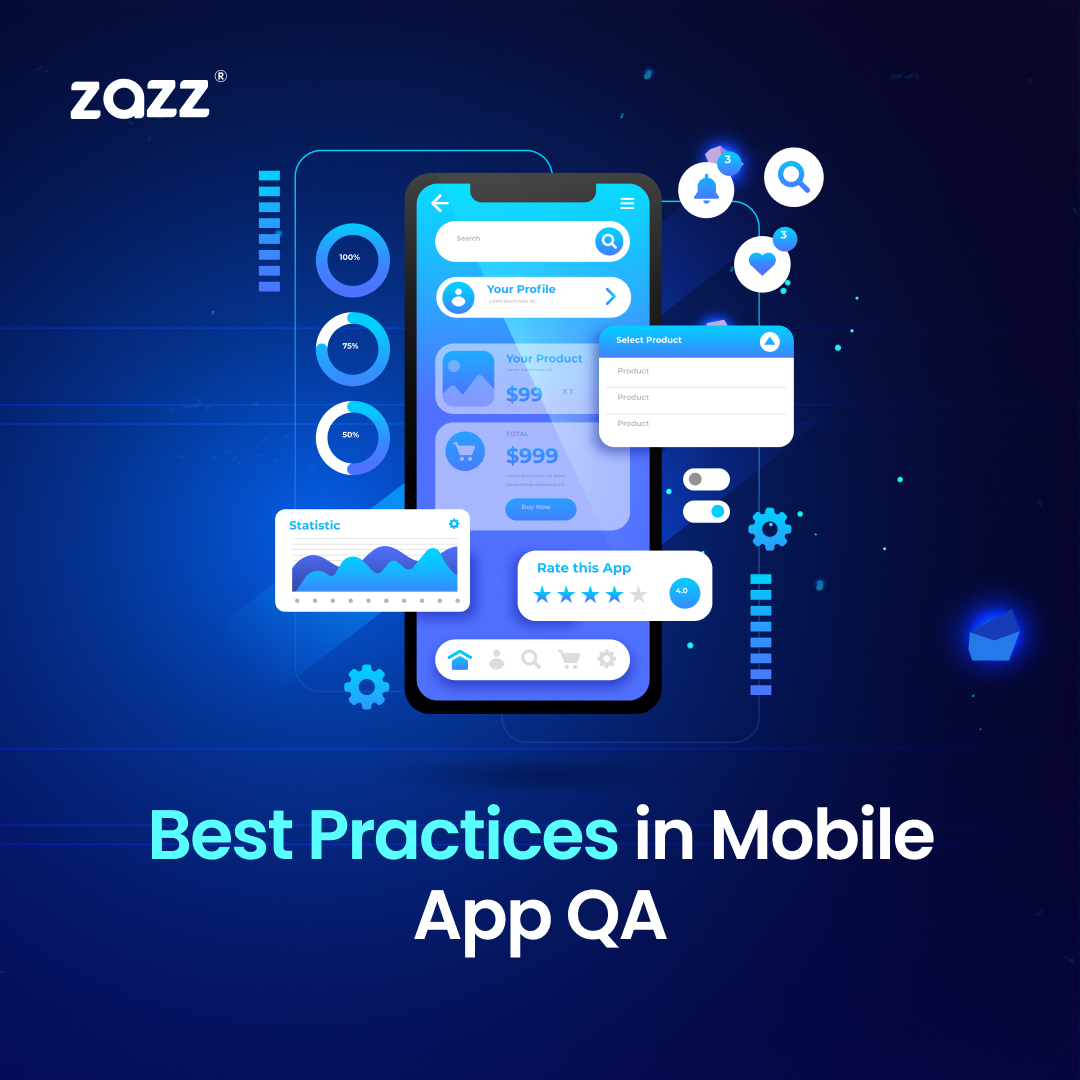
Can you even imagine a mobile app working flawlessly on day one? It sounds too good to be true. But with rock-solid mobile app quality assurance, it is possible. QA separates the apps that will make it from those that won’t.
These days, users expect nothing less than excellence. They want apps that wow them with innovative features yet run super smooth. That’s why rigorous QA is essential to keep users happy and set your app up for success. A comprehensive testing approach helps ensure every app component looks and functions just right.
This guide will explore why quality assurance deserves a prime spot in your app development flow. We will explain how implementing a smart QA strategy helps you launch and maintain a high-performing mobile app that delights users. Let’s dive in!
Also Read:
Top 10 Mobile App Development Companies in New York
The Role of QA in User Experience
Quality assurance is vital for delivering a satisfying user experience in mobile apps. It verifies that an app does what it claims. Take a fitness tracking app – you expect it to count each step you take, right precisely? QA helps ensure the app meets expectations and works as advertised.
Now think about performance. A smooth, responsive app makes users happy. But slow load times quickly frustrate and drive folks away. When you bring a software developer on board, their QA team works tirelessly behind the scenes. They run intensive stress tests to guarantee the app performs well under heavy usage. Their goal is to ensure your app runs smoothly, whether it’s the user’s first or thousandth time opening it.
The QA team aims to confirm your app functions appropriately in the long. They want to save you from dealing with unhappy users due to bugs or lagging performance. Solid QA gives users a seamless experience and keeps them engaged over time.
Here’s a great example. Flud’s initial launch had numerous bugs due to inadequate QA. Recognizing this, the team prioritized quality in their relaunch with a dedicated QA team. This shift led to a well-received product, user base growth, and increased revenue.
QA as a Risk Management Tool
Quality assurance means spotting problems before your users stumble upon them. Before unleashing your app, the QA team inspects every nook and cranny for anything that could disrupt the user experience. They leave no stone unturned in checking for potential issues and squashing bugs. This proactive bug hunt prevents frustrations and keeps users smiling from day one. If this step is missing in your product’s lifecycle, you should at least hire a software developer with relevant skills to perform these checks.
Protecting your brand’s reputation is serious business. Just one pesky bug can spark a wildfire of negative reviews. And we all know thoughts make or break an app’s success. QA allows you to patch cracks before they split into canyons. Fixing issues ahead of time acts like a shield against reputation-ruining disasters.
Take the 2020 Microsoft Teams outage caused by an expired certificate, for example. Microsoft quickly solved the problem, apologized, and vowed to improve their system’s certificate monitoring and timely updating. This response aimed to avert future disasters by ensuring their certificates stay current through robust tracking. Experts recommend choosing the right talent or application development services that can mitigate unexpected downtimes.
QA’s Impact on App Retention and Success
Quality assurance can determine whether an app succeeds or fades into oblivion. A polished, bug-free app keeps users coming back for more. If an app performs flawlessly, loads instantly, and delivers on promises, why ditch it? This is QA’s domain. It helps guarantee every user interaction convinces people to stay rather than stray.
Furthermore, star ratings hold serious power. Positive reviews can catapult an app up the charts. When users enjoy a smooth experience, they’re inclined to leave shining reviews. Solid ratings attract new users, starting a virtuous cycle of success fueled by thorough QA.
Critical Components of a Strong QA Strategy

When crafting a rock-solid QA plan for mobile apps, every piece carries equal weight in providing a seamless, bug-free user experience. Let’s break down these crucial elements of a winning QA approach.
Test Planning and Design
A stellar QA strategy starts with meticulous planning. You need a crystal-clear vision of the finished product. Test planning entails defining goals, scope, resources, and timelines. Careful planning ensures every feature gets vetted and meets high standards before going live.
Manual Vs. Automated Testing
Next comes choosing between manual and automated testing. Manual testing is hands-on, providing real human insight into the user experience. Automated testing is like programming dominoes – tests can run quickly and frequently once set up. The key is balance. Automate repetitive tasks but rely on human evaluation for complex, subjective aspects.
Continuous Integration and Delivery
Continuous integration and delivery keep your app competitive. This means frequently and automatically integrating code changes into a shared repository and releasing updates. It’s a loop of constant betterment to keep your app robust and cutting-edge.
An Effective QA Test Plan
Let’s explore an effective test plan for a popular note-taking app. The programming team schedules weekly automated checks of core features like saving and syncing notes across devices.
Before significant releases, they manually test. They use continuous integration to merge code and get immediate feedback for minor tweaks.
Consequently, the app performs at its peak with minimal bugs and happy users. It exemplifies how strategic QA sustains excellence and success.
Best Practices in Mobile App QA

Whether improving an existing app or building a new one, these practices lay the foundation for greatness. Let’s dive into premier mobile QA best practices:
Prioritize Critical Test Scenarios
In mobile QA, it’s wise to tackle major pain points first. Pinpoint your app’s most frequent user interactions. A savvy programming team thoroughly tests these high-traffic areas. For an e-commerce app, a smooth checkout is critical. Nail it, and you’re halfway there.
Embrace User Feedback
User feedback is liquid gold. It provides direct intel on what’s working and what’s not from the user’s perspective. Incorporating this into your QA process is crucial. Addressing user-reported frustrations boosts satisfaction.
Continuous Improvement Cycle
Finally, adopt a continuous improvement mindset. Test, gather data, learn, and test again. This loop keeps enhancing the app over time. Rather than quick fixes, make lasting excellence the goal. You may even hire a software developer specifically to ensure every issue related to the app is addressed without delay.
Also Read :
Zazz Ranked Among Top Mobile App Development Companies In USA
Conclusion
Rock-solid quality assurance is the secret sauce for mobile apps that wow. QA catches bugs before they bite, ensuring features function as expected. Thorough testing saves time, money, and headaches down the road. Quality assurance boosts satisfaction with smoother, reliable apps. Developers build user trust through increased quality by baking QA into the development process. Don’t cut corners on testing – invest in QA excellence.
Ready to delight users with a top-performing app? Get a quote for app services with Zazz
Frequently Asked Questions
By hunting down defects before users encounter them, quality assurance allows you to squash bugs and polish functionality, transforming glitchy software into a smooth, reliable gem.
Quality assurance is the guardian of user experience in web development, securing cross-browser and cross-device compatibility to maintain a polished online presence that wows visitors.
Recent Articles
Table of Content 1. Data Engineer vs. Data Scientist: Understanding...
Table of Content 1. What is the Carnival in Brazil?...
Table of Content 1. What is IT Staff Augmentation? 2....












